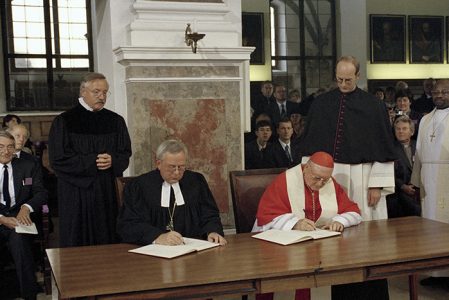Posted on: March 27, 2019 8:13 AM

The Presidents of the Lutheran World Federation, Christian Krause, and the Pontifical Council for Promoting Christian Unity, Cardinal Edward Idris Cassidy, sign the Joint Declaration on the Doctrine of Justification at St Anna’s Lutheran Church in Augsburg, Germany, on 31 October
The five Christian denominations closely associated with the Joint Declaration on the Doctrine of Justification(JDDJ) are taking part in a private consultation and public events this week to discuss how to take the document further. The JDDJ was originally agreed by the Roman Catholic Church and the Lutheran World Federation in 1999. The significant ecumenical text has been described as resolving the doctrinal dispute at the heart of the Reformation; and has since been adopted or affirmed by the World Communion of Reformed Churches, the World Methodist Council and the Anglican Consultative Council.
The ACC “welcomed and affirmed the substance” of the JDDJ at its meeting in Lusaka in April 2016. In October 2017, on the 500th anniversary of the Reformation, the Archbishop of Canterbury presented a signed copy of the ACC resolution to the General Secretary of the Lutheran World Federation, Dr Martin Junge; and the Secretary of the Pontifical Council for Promoting Christian Unity, Bishop Brian Farrell, during a service in Westminster Abbey, which was also attended by the General Secretaries of the World Methodist Council, Ivan Abrahams and the World Communion of Reformed Churches, Dr Chris Ferguson.
This week’s meeting was agreed in June last year, after representatives of the five Christian denominations or communions met in Rome to discuss the implications of the Joint Declaration.
“We have now five signatories of this ecumenical declaration,” LWF’s Assistant General Secretary for Ecumenical Relations, Kaisamari Hintikka, said after the Rome meeting. “We feel we are called to ask together what kind of spiritual and ecclesiastical consequences the JDDJ might have for our churches.
“We are witnessing momentum in our shared ecumenical journey. This consultation is meant to appreciate and to use that gift, which calls us to healing the wounds in the body of Christ. This consultation will be the beginning of a process that aims to respond to the aspirations of the people in the pews. We want to offer our churches recommendations in order to grow in communion.”
The Anglican Communion’s Director for Unity, Faith and Order, Canon Dr John Gibaut, was at the Rome Meeting. “If the JDDJ is the key that help us unlock the core doctrinal issue from the Reformation, and the Anglican Communion, the World Methodist Council, along with the Lutheran World Federation and the Catholic Church now laid claim together to this common key, the possibilities of opening new doors of ecumenical growth and cooperation are vast,” he told ACNS after the meeting.
This week’s consultation and public events are taking place at the University of Notre Dame in Indiana, in the US. “This 1999 document expresses a shared understanding on the nature of salvation as being by God’s grace through faith in Jesus Christ, and addresses fundamental issues that have divided Christians for centuries”, the University said in a statement. “The goal of the ecumenical consultation at Notre Dame is to provide recommendations for how the Christian communities that have adopted the Joint Declaration can demonstrate deeper communion with each other.”
An ecumenical prayer service took place last night (Tuesday) in the Basilica of the Sacred Heart. The service, which included music from the Notre Dame Liturgical Choir, was attended by the Secretary General of the Anglican Communion, Dr Josiah Idowu-Fearon, as well as Cardinal Kurt Koch, President of the Pontifical Council for Promoting Christian Unity; Dr Martin Junge, General Secretary of the Lutheran World Federation; Dr Jong Chun Park, President of the World Methodist Council, and Chris Ferguson, General Secretary of the World Communion of Reformed Churches.
Tomorrow (Thursday), at 5 pm EDT (9 pm GMT), senior representatives from the five denominations will take part in a public panel discussion on the theme “From Conflict to Communion: The Future of Christians Together in the World”
“Notre Dame’s commitment to ecumenism is an essential dimension of our character as a Catholic university,” the University’s Vice President for Mission Engagement and Church Affairs, Gerry Olinger CSC, said. “We share in Jesus’ prayer for unity, and we seek to build a culture of encounter which leads to greater understanding, collaboration and love. Notre Dame strongly agrees with Pope Francis when he says that ecumenism is not optional.”
FIRST PUBLISHED:
March 27, 2019 ACNS Website

